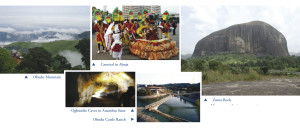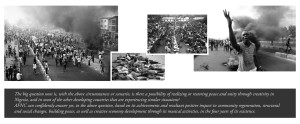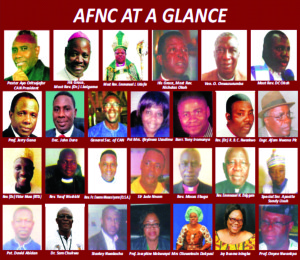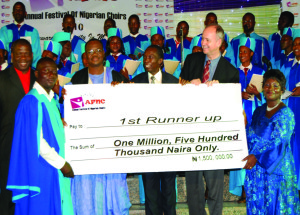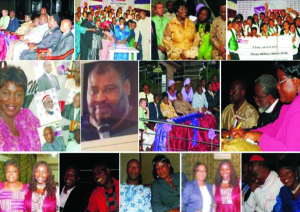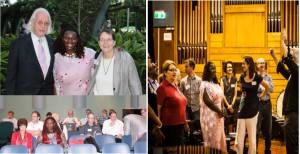Choral Music, a Vehicle for Social Change in Nigeria
By Ifeyinwa (Ify) Ebosie, President and Initiator of the Annual Festival of Nigerian Choirs (AFNC)
AFNC: Catalyst for a desirable society
The Nigerian system is by nature very complex given that it is made up of a large number of interconnected components which interact in diverse ways, such as its universally recognized ecological resources, and numerous tangible and intangible heritages, that derive from the country’s socio-cultural differences and the diversities of over 250 ethnicities and cultures (http://tourism.gov.ng/).
However, the inappropriate management and interfacing of the various ethnic activities and cultures has resulted in social stratification, mechanical solidarity, proliferation of ethnic rivalries, and violent conflicts, as well as, nationally, a high rate of unemployment. For instance, since the inception of the democratic government in May 1999, Nigeria has lost innocent lives in ethno-religious and political crises, and is presently facing terrorist attacks.
The birth of a quintessential mission: the annual festival of nigerian choirs
The people’s quest for peace and unity in the midst of so much violence in the country is what led to the birth of the AFNC. Every geo-political zone in Nigeria at the time had in some way or another tasted the bitter pill of violent conflicts.
The AFNC is an annual, nationwide community engagement event that seeks to build a desirable society for all through its highly transformative framework.
The AFNC framework, known as the “AFNC model of practice”, demonstrates how music as a universally accepted language and non-violent medium can be used to unlock the cultural and creative economy potentials of communities and their constituents, by re-engineering their socio-cultural capital, as well as building their human creative capacities, facilitating concrete measures and changing the perspective that is needed for community regeneration, peace-building, and creative economy development.
The model deploys the AFNC activities and practices in four functional groups: pre-event activities, main activities, post-event activities, and performance and program evaluation.
Pre-event activities: strengthening cultural diversity
These activities serve to provide reliable data on the unique cultural and creative activities and the capacities of the communities for socio-cultural capital re-engineering, and consequently promote development of policies that will gradually transform creative activities feedback into formal, creative, and cultural economy. The aim is also to strengthen diversity, and to assess the capacity of religious activities to meet the prerequisite of social solidarity and national integration, by using activities such as courtesy call visits and focus group sessions during the AFNC preliminary festivals in the local communities.
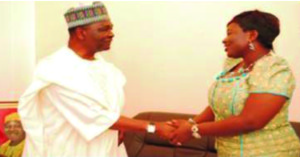
Main event activities: unity in diversity by inter-cultural cooperation
The AFNC grand-finale in the country’s capital, Abuja, is the platform that addresses the issues of inequality, sub-cultural biases or differences, and ethnic rivalries. The AFNC offers equal opportunities to the various strata of society through involvement, participation, and creative cultural activities no matter what part of the country they come from, through the following musical categories: religious choral groups, educational institutions’ choral groups, and social choral groups.
Annually, the event fosters a networked integrated system, by bringing together and connecting the winners of its preliminary festivals and other activities. These winners represent various ethnicities and cultures from all over the country, including those from vulnerable and post-conflict areas. This way, unity in diversity is facilitated through innovative and aesthetic inter-cultural musical expressions and dialogues. The communities become self-organizing enough to react reasonably to diversity and change, and collectively exploit solutions to conflicts and other challenges through inter-cultural cooperation, social inclusion and cohesion. At the various levels, participants receive certificates, medals, trophies, and prizes.
Post-event: transforming creative cultural talents and activities into engines for economic development
This phase of the AFNC demonstrates the importance of culture and creativity as both a driver and enabler of sustainable human development. After the event, the AFNC uses this platform to fully utilize the energy and productive potentials of restive but creative and talented youths, in addition to other vulnerable groups such as women who are usually victims or tools of violent activities in the country.
The candidates are screened, with those eligible being trained through the AFNC community in human creative capacity. Vocational courses are also offered for those identified as potential players in the creative sector, such as musicians, performing artists, managers, and agents. This way, the AFNC contributes hugely to building the capacity of communities, and to the systematic structuring of the cultural and creative industry by filling the gap in the various dimensions and stages of the value chain. The AFNC also contributes to transforming their creative cultural talents, activities, and performances into engines for economic development in communities.
Monitoring and evaluation activities: AFNC program implementation measures
These are activities that are associated with measuring to what extent implementation has accomplished objectives and/or solved initially identified challenges. The orientation here is that each state, ethnicity, or culture is unique, and should therefore be targeted uniquely to strengthen diversity and distinctiveness in order to maximize economic and non-economic profits in each community.
Virtually all communities in Nigeria are enormously rich in a unique untapped heritage of cultural and creative potentials, including musical festivals and performances.
Despite the encouraging prospects, many opportunities for value creation have gone unrealized because of obstacles such as lack of investment, lack of entrepreneurial skills, and inadequate infrastructure to support the growth of the industry. To address these barriers and aid in building a desirable society, the AFNC welcomes partnerships, strategic alliances or collaborations, and exchange programs, especially within the tenets of choral music development, i.e. creation, production, and distribution of cultural and creative products, and re-engineering community socio-cultural capitals. In view of the above, the AFNC participated in the Fifth World Forum on Music Conference, in Brisbane, Australia.
This article is based on the AFNC’s interactions with all its active stakeholders and partners, its activities and experiences in the five years of its existence, as well as the united nation’s special report on creative economy.
Edited by Charlotte Sullivan, UK
